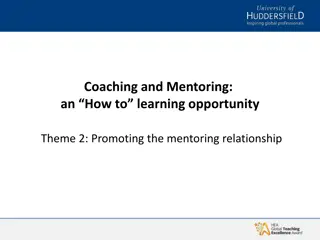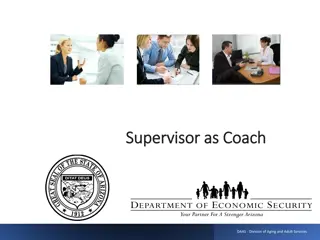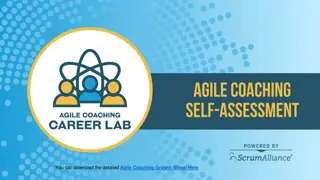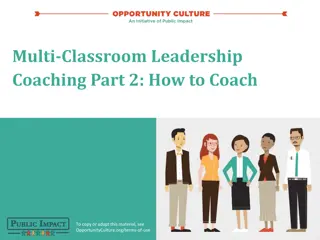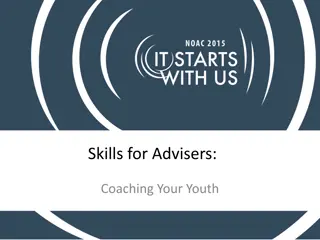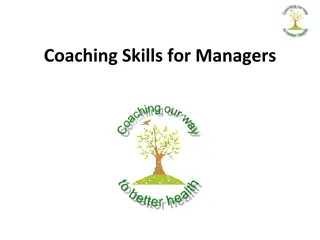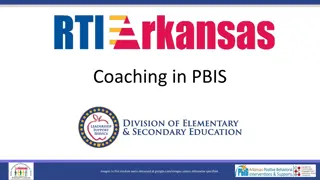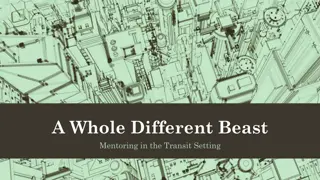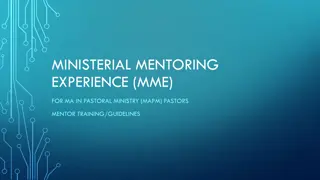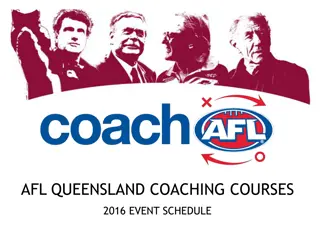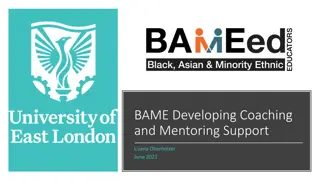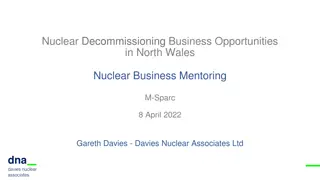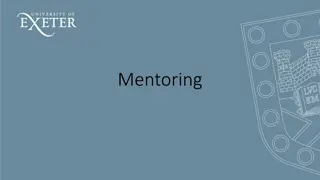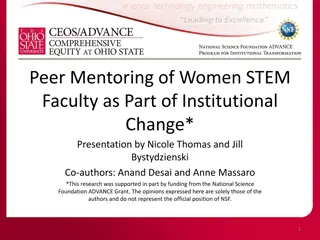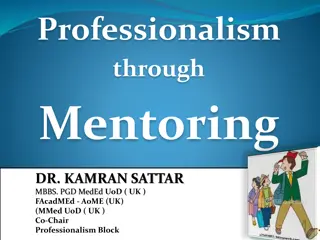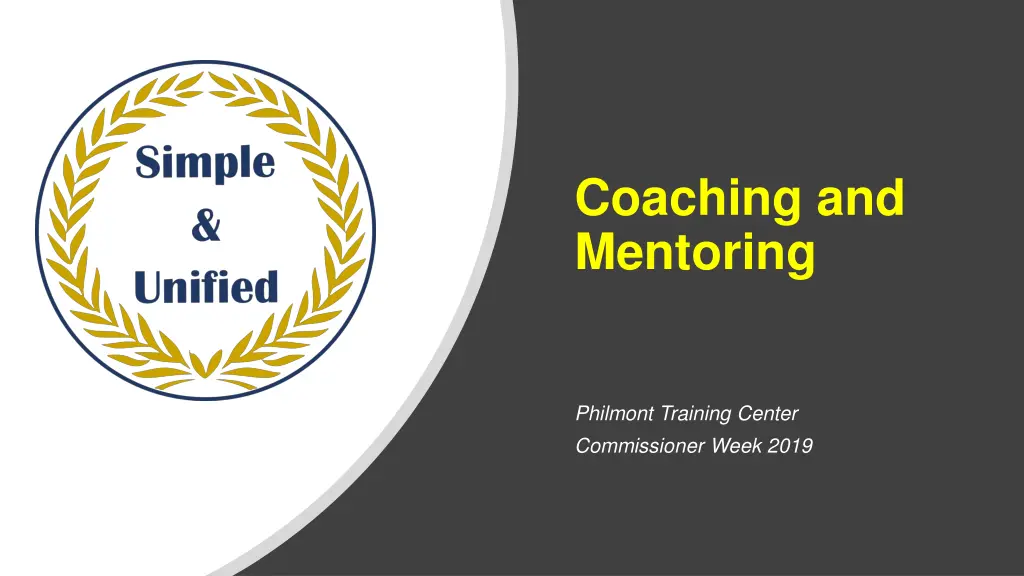
Effective Coaching Strategies for Volunteer Leaders
Explore the key principles of coaching and mentoring in volunteer leadership. Learn about the purpose of coaching, how it can benefit new and experienced leaders, and when to consider coaching for effective team development. Discover the actions and benefits of coaching while understanding the impact it can have on individuals and organizations.
Download Presentation

Please find below an Image/Link to download the presentation.
The content on the website is provided AS IS for your information and personal use only. It may not be sold, licensed, or shared on other websites without obtaining consent from the author. If you encounter any issues during the download, it is possible that the publisher has removed the file from their server.
You are allowed to download the files provided on this website for personal or commercial use, subject to the condition that they are used lawfully. All files are the property of their respective owners.
The content on the website is provided AS IS for your information and personal use only. It may not be sold, licensed, or shared on other websites without obtaining consent from the author.
E N D
Presentation Transcript
Coaching and Mentoring Philmont Training Center Commissioner Week 2019
Coaching Philmont Training Center Commissioner Week 2019 Coaching
Understanding the Purpose of Coaching
What is Coaching? WHAT IS COACHING?
What is Coaching? Coach Definition: In the words of Sir John Whitmore: Unlocking a person s potential to maximize their own performance. It is helping them to learn rather than teaching them.
In the workplace Can it apply in our volunteer structure?
Coaching and Developing Others Key Actions: Clarifies performance Provides timely feedback Conveys performance expectations and implications Evaluates skill gaps Guides development Fosters developmental relationships
Coaching, if.. Done well, can transfer knowledge on a continuous basis by increasing individual motivation and morale and help individuals/teams deliver outstanding results. Done poorly, can waste the time of valuable resources, create a hostile environment and create suboptimal teams and organizations.
Who Can Benefit from Coaching New Leaders Experienced Leaders Committee Members Chartered Organizations Commissioner Team Members
When to Consider Coaching When someone needs encouragement in a difficult task. When the need for an answer or a solution is isn t immediate. When a problem needs to be solved.
Coaching offers certain BENEFITS to you as a volunteer leader: Take time to understand Demonstrate commitment Develop skills Develop effective working relationships Promote effective change management
The Coachee BENEFITS include: Learn to solve their own problems Improve skills and performance Learn how to identify and act on development needs. Have greater confidence and accept responsibility Develop greater self-awareness and gain new perspectives on ability Acquire new skills and abilities
Why are Coaching skills important? Why are Coaching Skills Essential Provide timely guidance and feedback Guide and support others to excel
Coaching 7 Essential Questions: The Kickstart Question The AWE Question The Focus Question The Foundation Question The Lazy Question The Strategic Question The Learning Question
1.Stay Curious, Stay Genuine 2.Ask It One More Time 3.Recognize Success 4.Move On When It s Time
Relationship Building Elements between you and other volunteers: Develop trust Mutual respect Appreciate diversity Open communication Be mindful Get to know them and allow them to get to know you.
A MINDSET is A set of assumptions, methods or notions held by one or more people. A mindset can also be seen as incident of a person's world view or philosophy of life. A mindset may be so firmly established that it creates a powerful incentive within these people or groups to continue to adopt or accept prior behaviors, choices, or tools.
C.O.A.C.H. Mindset C.O.A.C.H Mindset
Clarify Clarify Expectations Needs Level of Trust
Observe Observe Through Evaluation and Inspection Through Conversations Through Direct Observation Look for Lead Measures (not just lagging indicators) Give immediate specific feedback
Ask Being Present Active Listening Allow Self-Discovery (Root Cause) Asking Questions - Status (history) - Issue (discovery) - Impact (present state)
Collaborate Having trust Engaging 2 Way Conversations Asking More Questions - Ideal (future state) - Intention (going forward) Allow the coachee to self- generate in developing the plan
Help Help Foundational to the coaching process Be positive Be supportive Be authentic Be consistent Walk the Talk Provide resources Give appreciative and constructive feedback Always follow up
Using the C.O.A.C.H. Mindset Four Types of Coaching Scenarios Behavior Performance Development Situational
Behavior Coaching Consistently late for appointments Missed deadlines Easily distracted Uniform
Performance Coaching High performer who is highly motivated Ascending performer Inconsistent or under performer Someone who is no longer successful
Development Coaching New assignment/project Through change Evaluating skill ability
Situational Coaching Impromptu happens at any time. Reinforces, Redirects. Focuses on timely, more reactive needs, questions, objectives, or challenges. Typically shorter conversations. Schedule additional time if needed. Happens in practically every conversation.
Mentoring Philmont Training Center Commissioner Week 2019 Mentoring
What is a mentor? WHAT IS A MENTOR?
What is a Mentor WHAT IS A MENTOR? A WISE TEACHER A GUIDE A FRIEND
Is Mentoring Like Coaching? IS MENTORING LIKE COACHING?
Is Mentoring Like Coaching Coaching is the process of facilitating the performance, learning, and development of another person. Coaching is different from mentoring because the mentoring process is led by the learner and is less skills- based.
A Good Mentoring Relationship Two way relationship No direct-line relationship Extra element
Some Key Differences Coaching Mentoring Goals To correct inappropriate behavior, improve performance, and impart skills as an individual accepts a new responsibility To support and guide the personal growth of the mentee Initiative The coach directs the learning and instruction. The mentee is in charge of his or her learning. Focus Immediate problems and learning opportunities Long-term personal development Roles Heavy on telling with appropriate feedback Heavy on listening, providing a role model, and making suggestions and connections
Models of Mentoring Sponsorship mentoring is a relationship between a mentor and a prot g Developmental mentoring is less hierarchal and helps the growth of both the mentor and the mentee.
A Scouting Mentoring Relationship Are mentors assigned? How do we find them? How does mentoring happen?
Shape of a Mentoring Relationship Will be different Evolves over time May take and adjust its shape
What Mentors Do The MENTOR Model Mindset: Attitudes, social intelligence , and values Environment: Help understand the unit environment and culture Network: Connect to others who might be able to help Trust: Trusted, confidential counsel and perspective Open: Advice, support, and/or guidance on difficult subjects Retention: Aid in retention of the mentored
Tips on Being a Good Mentor Provide a safe nonthreatening environment Keep confidences Build trust early Be a good listener Share personal experiences Ask Questions Compliment the person
Learning Conversation Steps 7 Essential Questions Reaffirmation Identify the issue Building mutual understanding Exploring alternative solutions Final check
7 Essential Questions Revisited: The Kickstart Question The AWE Question The Focus Question The Foundation Question The Lazy Question The Strategic Question The Learning Question
Benefits of Mentoring For the mentee Improved knowledge and skills Greater confidence and well-being For the mentor Greater satisfaction New knowledge and skills Leadership development For Scouting Improved morale, motivation, and relationships
Key Findings Mentoring is not Coaching Mentoring in Scouting happens organically Key to mentoring is the relationship Mentoring is a 2 way street Mentoring can be a sustainable relationship
Coaching and Mentoring Philmont Training Center Commissioner Week 2019

